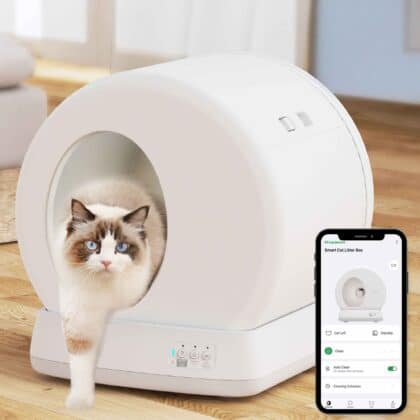
Does Your Cat Really Listen to You?
Have you ever wondered if your cat is really listening to you, or if they just show up because they heard the treat bag? Well, a recent study from Université Paris Nanterre in France might just have some answers for us cat lovers. The Refined Feline takes a closer look into the study and how cats react to the sound of their human’s voice, and the results are pretty fascinating.
What Did They Do?
To start the study to determine if cats listen, the researchers gathered up 16 house cats and played them recordings of their owner’s voice. Sometimes the voice was talking directly to the cat, like how we usually chat with our furry friends. Other times, the voice was talking to another human, using a regular talking voice, not the cutesy one we all use for our pets. And guess what? The cats acted differently depending on which type of recording was played.
Cats Know When We’re Talking to Them
When their human was talking to them, even through a recording, the cats perked up and paid more attention. But when the voice in the recording switched to a human-to-human chat, the cats were like, “Meh, not interested” and showed less attention. Even more interesting, when a stranger’s voice called out their name, most of the cats didn’t really care much. But as soon as they heard their human’s voice again, talking directly to them, they were all ears once more.
Related: Why Is My Tabby Cat So Vocal?
What Does This Mean?
This study tells us that cats really do pay more attention to us than we might think. They can tell when we’re talking directly to them with that special voice we use just for them. It’s not just about recognizing the sound of our voices; it’s about understanding the difference in how we talk to them versus how we talk to other people.
Why Should Cat Owners Care?
For anyone who shares their home with a cat, this study is super cool because it shows just how much our furry friends are tuned into us. They’re not just waiting around for food (okay, maybe they are a little bit); they’re actually listening to how we speak to them. This means that talking to your cat, using that special voice, isn’t silly at all. It’s a real way to bond with them and make them feel loved and noticed.
Making the Most of This Info
Knowing that your cat really is listening can change how you interact with them. Here are a couple of quick tips:
- Keep Chatting: Talk to your cat often. They recognize and react to your voice, especially when you’re using that “just for them” tone.
- Pay Attention: Notice how your cat reacts when you talk directly to them. It’s a great way to strengthen your bond and learn more about what makes them tick.
Getting Even Closer to Your Feline Friend
This insight into our cats’ behavior isn’t just a neat party fact; it’s a tool we can use to deepen our relationships with our furry family members. Here are a few more ways to use this knowledge to get even closer to your cat:
- Personalize Your Conversations: Now that we know cats can distinguish when we’re speaking directly to them, try personalizing your chats even more. Share your day, tell them about the funny thing you saw online, or just express how much you love them. They might not understand every word, but your tone and attention will mean the world to them.
- Respect Their Responses: Pay attention to how your cat responds when you talk to them. Do they come closer, purr, or meow back? Their reactions can give you clues about how they’re feeling and what they enjoy. This two-way communication is a beautiful part of living with a cat.
- Experiment with Different Tones: Have fun experimenting with different tones and see how your cat reacts. You might find they come running for a certain pitch or speed of speaking, giving you more ways to engage with them meaningfully.
- Include Them in the Family: Cats understand more about human interactions than we give them credit for. Include them in family activities and talk to them as you would any family member. This inclusion can make them feel even more a part of the family pack.
The Impact on Multi-Cat Households
For those of us with more than one cat, this study could help manage dynamics in multi-cat households. Understanding that each cat might have a preference for how they’re spoken to can help in giving each cat individual attention and care. It’s a reminder that each cat is a unique individual, with their own likes, dislikes, and ways they prefer to communicate.
The Joy of Cat Ownership
What this study ultimately highlights is the joy and complexity of cat ownership. Cats are not just passive recipients of our care; they are active participants in a shared life, responding to and understanding us in ways we’re only just beginning to comprehend.
A Final Thought
Cats have been companions to humans for thousands of years, and studies like this one from Université Paris Nanterre only deepen our understanding and appreciation for these enigmatic creatures. It reveals the nuanced ways cats interact with us, responding to our voices and the intention behind our words. This knowledge can transform how we live with, care for, and love our feline friends.
So, the next time you catch yourself having a one-sided conversation with your cat, remember — it’s not as one-sided as you think. Your cat is listening, engaging, and appreciating the special bond you share. This study is a beautiful reminder of the depth of the human-cat relationship, a bond that continues to fascinate and delight cat lovers everywhere.










